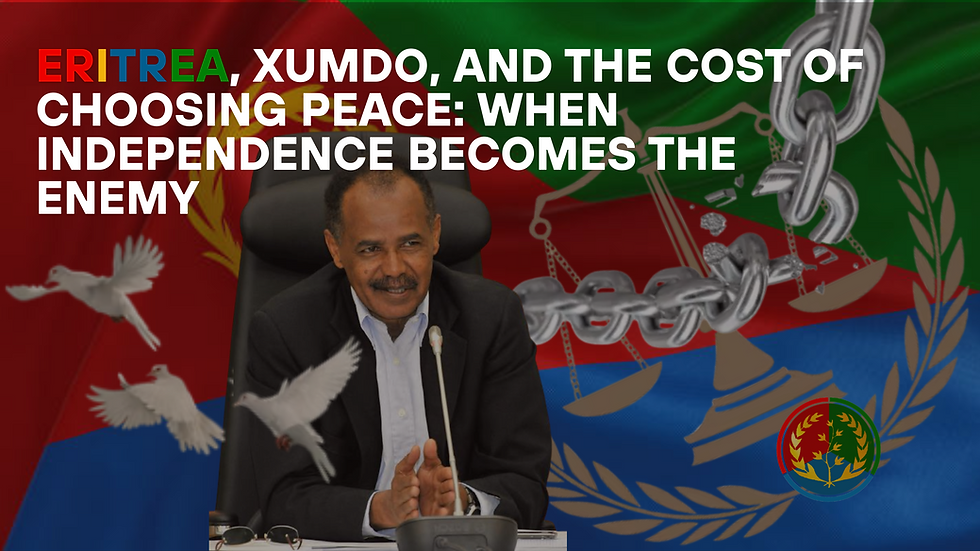The White House Debacle: A Wake-Up Call for the Global South and Africa
- Nakfa Eritrea
- Mar 2, 2025
- 4 min read
The recent diplomatic debacle at the White House, involving U.S. President Donald Trump, Vice President J.D. Vance, and Ukrainian President Volodymyr Zelenskyy, has ignited global conversations about the shifting dynamics of power. The tense meeting, which ended in a contentious fallout, revealed underlying fractures within Western alliances and serves as a stark reminder of the fragility of international relationships.
While the Western media has largely framed this incident as a simple disagreement, the implications go much deeper, particularly for the Global South and Africa. This event highlights a pattern of Western powers using alliances for their own strategic gains while discarding nations when their usefulness has run out. By examining NATO’s history, Russia’s response, and the broader geopolitical implications, it becomes evident that trusting Western powers comes with significant risks.
The White House Showdown: A Scripted Drama?
The February 28, 2025, White House meeting between Trump and Zelenskyy was expected to be a discussion about U.S. access to Ukraine's rare earth minerals. However, the meeting quickly turned into a political spectacle. Trump, visibly frustrated, accused Zelenskyy of provoking global conflict and abruptly withdrew support for the proposed minerals agreement. Vice President Vance backed Trump’s sentiments, criticizing Zelenskyy for demanding continued U.S. aid without what they saw as reciprocal gratitude.
The global reaction was swift. European leaders from Canada, Poland, and Lithuania publicly sided with Ukraine, while Russian officials saw the discord as a victory. The Western alliance, which had appeared unified against Russia, was showing cracks. This event, coupled with recent diplomatic missteps—including a veiled slight from the U.S. Vice President towards the United Kingdom—suggests deeper fractures in the Western power structure.
NATO’s Broken Promise and Russia’s Justification for War
At the heart of the Ukraine conflict lies NATO’s eastward expansion, a move that directly contradicts past assurances made to Russia. In 1990, during German reunification discussions, Western leaders assured Soviet officials that NATO would not expand “one inch eastward.” However, in the decades since, NATO has incorporated multiple Eastern European nations, creeping closer to Russia’s borders.
For Russia, NATO’s expansion represents an existential threat. When the alliance extended its influence into Ukraine, Russia saw this as the final straw, prompting military intervention. While Western media paints Russia as an aggressor, the reality is that NATO’s encroachment forced Putin’s hand. The West violated its original agreements, giving Russia a legitimate reason to push back.
This historical context is crucial for African and Global South nations to consider. Western promises are often temporary, made only when it benefits them. Just as NATO disregarded its commitments to Russia, Western powers have a long history of exploiting African nations for their resources while offering little in return.
The Global South’s Vulnerability in Western Politics
The events at the White House serve as a warning for Global South nations that continue to place their trust in Western alliances. Ukraine’s current situation is a testament to how quickly Western nations can abandon their so-called allies. Despite initially promising unwavering support, Trump’s administration is now publicly distancing itself from Ukraine.
This pattern is not new. Libya, Iraq, and Afghanistan all received U.S. backing—until they became inconvenient. African nations must take note. Trusting the West in military, political, or economic affairs often results in exploitation, followed by abandonment.
The recent remarks made by the UK representative following J.D. Vance’s comments further reinforce this reality. The UK official’s statement—implying that the U.S. has a history of silencing dissenters—highlights Western hypocrisy. The West claims to champion democracy and freedom, yet it has a long history of overthrowing leaders who challenge its dominance.
Africa’s Need for Strategic Independence
Africa must reevaluate its global alliances. Instead of relying on Western powers, African nations should look towards economic self-sufficiency and partnerships that do not come with strings attached. The development of alternative financial systems—such as BRICS and pan-African trade agreements—offers a path towards reducing dependency on Western aid and investment.
The recent White House incident is a clear example of how Western nations operate. Their alliances are transactional, not based on trust or mutual benefit. Africa, and the broader Global South, must use this as a lesson to build economic and political independence.
Conclusion: A Wake-Up Call for the Global South
The recent White House debacle is more than just a diplomatic misstep—it is a reflection of the changing world order. The U.S. is no longer the dominant global power it once was, and its shifting alliances reveal a desperate attempt to maintain control.
For African nations, this event serves as a reminder that trusting Western powers comes at a cost. Whether it is broken promises, economic exploitation, or political manipulation, the West has consistently prioritized its own interests over the well-being of its so-called allies.
As Africa moves forward, it must focus on self-reliance, economic sovereignty, and alternative partnerships that do not come with the risk of betrayal. The cracks in the Western alliance are growing, and the time has come for the Global South to chart its own path—one that is free from the grip of Western hegemony.
.png)



Comments